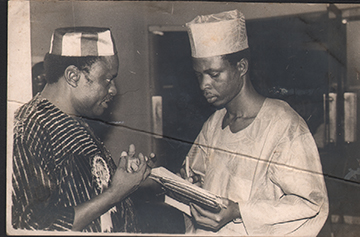WRESTLING
Power Mike: 20 years after…

It is 20 years today since the passing on of one of Nigeria’s greatest sports icon, Michael Okpala who was better known as Power Mike.
The former world wrestling heavyweight champion died at the National Hospital, Abuja, aged 64 on 11 March 2004.
At the time of his death, he had with him, an eternal legacy. He was a retired undefeated world heavyweight wrestling champion.
He had been a household name. Formerly engaging in superman show nationwide, Power Mike veered into wrestling and got his first breakthrough in 1970 when he defeated Gambia’s Massabula to win the African heavyweight title.
Three years later, he beat Ali Baba of Lebanon to win the world title. In his string of successful bouts, he defeated a host of notable wrestlers like Johnny Kwango, Power Jack, John Tiger, and Joseph Kovacs among others.
WRESTLING
Power Mike: 20 years after… –

It is 20 years today since the passing on of one of Nigeria’s greatest sports icon, Michael Okpala who was better known as Power Mike.
The former world wrestling heavyweight champion died at the National Hospital, Abuja, aged 64 on 11 March 2004.
At the time of his death, he had with him, an eternal legacy. He was a retired undefeated world heavyweight wrestling champion.
He had been a household name. Formerly engaging in superman show nationwide, Power Mike veered into wrestling and got his first breakthrough in 1970 when he defeated Gambia’s Massabula to win the African heavyweight title.
Three years later, he beat Ali Baba of Lebanon to win the world title. In his string of successful bouts, he defeated a host of notable wrestlers like Johnny Kwango, Power Jack, John Tiger, and Joseph Kovacs among others.
WRESTLING
Japanese wrestler moves to Senegal to master ancient martial art
In a dusty alleyway in the Senegalese city of Thies, Japanese wrestler Shogo Uozumi lay face-down in the sand after being tossed in the air by an oversized opponent.
Uozumi then rose to his feet, dusted himself off and rejoined the surrounding group of wrestlers wearing loincloths.
Back in a fighting stance, Uozumi smiled. After competing at national level in Greco-Roman wrestling back home, he swapped Tokyo for Thies last year to master a Senegalese wrestling style known as Laamb and to share his knowledge of the Olympic form of the sport with local talent.
“Every time I train, I feel myself getting stronger,” he said, catching his breath. “I feel a lot of joy and growth within me.”
Anchored in ancestral war rituals, Laamb has evolved from a post-harvest pastime into Senegal’s national sport. It blends physical combat and acrobatics, with victory marked by an opponent’s back touching the ground.
Uozumi discovered the style of wrestling during a trip to Senegal with Japan’s aid agency in 2017 and he was intrigued by cultural similarities including hospitality, known as Teranga in Senegal and Omotenashi in Japan.
Since relocating to Senegal full-time in 2022, Uozumi has lived with a community of wrestlers in Thies, Senegal’s third largest city. He has also set up an academy of three dozen students who he is helping prepare for the 2026 Youth Olympics.
“He showed me what it means to commit oneself, to leave one’s country without being well-paid, knowing that he would only have enough to live on, to develop our sport,” said Cheikh Badiane, a Laamb wrestler and one of Uozumi’s closest friends.
“I would help him whatever it cost me.”
At an Olympic-style national competition last month in Saint-Louis, Senegal’s colonial capital, hundreds jostled for views as Uozumi and Badiane coached their wrestlers from the sidelines.
One of their students went home with the silver medal in her weight class.
“Senegalese people live together, with their families, their friends, and they all support each other in this way,” Uozumi said on returning to Thies. “That’s my kind of culture.”
-Reuters
-

 Nigerian Football1 week ago
Nigerian Football1 week agoI prefer a foreign coach for the Super Eagles, says Amaju
-

 Olympics5 days ago
Olympics5 days agoBrazilian women train in Zidane’s birthplace ahead of Nigeria Super Falcons clash
-

 Premier League1 week ago
Premier League1 week agoNigerian-born Man United’s new striker promises creativity and unpredictability to fans
-

 Nigerian Football1 week ago
Nigerian Football1 week agoOsimhen’s outburst was a moment of madness, says Amaju
-

 Olympics10 hours ago
Olympics10 hours agoThis is my story: Odegbami on how he is stranded in London
-

 Olympics6 days ago
Olympics6 days agoTeams plan for lack of toilets on Paris opening ceremony barges
-

 OBITUARY1 day ago
OBITUARY1 day agoBREAKING! Former Heartland FC owner, Iwuanyanwu, dies at 81
-

 Olympics4 days ago
Olympics4 days agoSuper Falcons’ opponent, Brazil’s Marta and 3 Africans listed among 10 footballers to watch at Paris 2024


